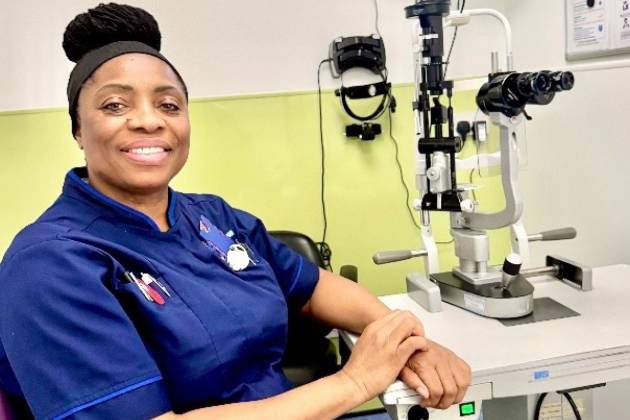How would you describe your role?
As far as I’m aware, I’m the only nurse in the UK doing this role. It’s not something nurses generally do – the advanced practitioner role is present in other areas of ophthalmic nursing, but not in A&E.
I examine and treat patients with a range of eye-related emergences in A&E at Moorfields Eye Hospital, including injuries, infections, and visual disturbances, working autonomously and in collaboration with ophthalmologists.
How did you get here?
I was at a crossroads and bumped into one of my former employees at a jobs fair. She said: “I have an application for eyes, but it’s not for me, are you interested in eyes?”.
The role was for a training ophthalmic nurse position at Moorfields. It was great timing for me.
I wanted a more clinical and educative role after care home management roles in the private sector, so I accepted the pay cut and came back to the NHS. I’ve never looked back.
I went on to do my master’s in clinical ophthalmology, and I’ve now been at Moorfields 21 years, with five in my current role.
If something goes wrong with your eyes, your whole world falls apart
What are five things you do in an average week?
- Clinical work – I treat or manage patients with undiagnosed eye conditions, with consultant support if needed.
- Educational work – I’m a module lead for advance clinical practice and an honorary clinical lecturer at University College London, and teach there and at the hospital.
- Research – I undertake regular internal audits around my specialty.
- Leadership – I’m the clinical lead for A&E and supervise and train other ophthalmic nurses.
- Charity work – I’m regularly involved in outreach charity programmes.
What things do you do in this role, that other nursing staff don’t?
I can assess, treat, and prescribe for many patients at the eye hospital without them needing to see a doctor, and also refer to another specialty if required.
Any specialist equipment or procedures?
I use a slit-lamp (see below) – a specialist magnifying microscope with a bright light attached – with a volk lens to view the back of the eye. This posterior segment examination is commonly known as fundoscopy.
I also use a tonometer – used to measure eye pressure – as well as one called a Goldmann Applanation Tonometer which is considered the gold standard method.
For some examinations, I might use an indirect ophthalmoscope – this device allows for a wider view of the retina without the need for pupil dilation.
I also sometimes do corneal ulcer scrapes, where we take samples for biopsy.

Five key qualities a nurse needs to do this job?
Enthusiasm, determination, hard work, good communication skills, and the ability to show confidence. The way you present yourself to a patient helps give them the confidence to let you care for their eyes.
What’s most challenging about the job?
As it’s a pioneering role within the UK, I’ve often felt I’ve had to prove myself. I’ve had people looking at me like an imposter wondering what I’m doing working at such an advanced level as a nurse practitioner in A&E. I’ve had to break down a few barriers along the way.
And most rewarding?
The rewards aren’t financial but the job satisfaction I get with my patients is the real reward.
Eyes are so involving – if something is wrong with your eyes, your whole world falls apart. Many patients arrive crying and worried, in pain or afraid of losing their vision.
Imagine taking someone from that kind of mentality and reassuring them every step of the way, that you will look at them, and you will help work it out.
From soothing anxiety, to giving anaesthetic for the pain and a prescription to take home, to reassuring them that all things being equal, their vision won’t be lost, I get to witness the relief and gratitude my patients feel. That’s why I do this job. It’s so satisfying to see someone go home happy.
What would you like to see change for ophthalmic nursing?
I’m passionate about raising the profile of ophthalmic nursing. For me, it’s for future generations as it’s becoming extinct in my opinion – we’re just not at the table when decisions are made. This is very close to my heart, as the profession I’ve spent my whole life in is simply not recognised.
We don’t have registration for ophthalmic nursing under NMC titles – my registration is “general adult nurse”.
It’s painful to think that after 30 years in ophthalmic nursing I don’t get a title as an ophthalmic nurse on the register. I hope that if I keep the conversation going on this, it will change in time.
Find out more
Join the RCN Ophthalmic Nursing Forum








